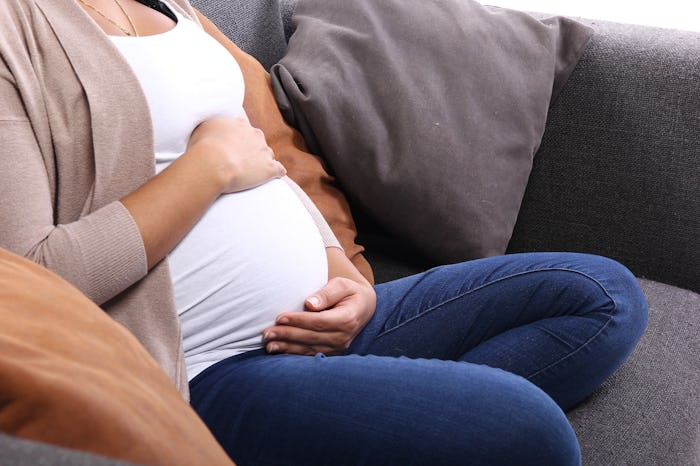Life

Here's What You Need To Know About Increased Anxiety As Labor Approaches
Most expectant moms, especially first-time mothers, probably feel at least a little bit anxious about delivering their baby. How long will labor last? What if there’s an emergency? You may feel some stress prior to delivery, but is anxiety a sign of labor? For women who feel pangs of anxiety before their contractions even start, docs agree that it’s probably more mental than physical.
Felice Gersh, MD, is an OB-GYN and founder/director of the Integrative Medical Group of Irvine, and author of PCOS SOS: A Gynecologist's Lifeline To Naturally Restore Your Rhythms, Hormones and Happiness. She tells Romper in an interview that anxiety isn’t a normal or expected symptom of labor. “I’ve never seen this in 25 years of practicing obstetrics; However, high anxiety can trigger labor. I would state it the opposite way — severe anxiety states can trigger labor, rather than implying anxiety is a normal phase women pass through as they enter labor,” she explains.
“I think it’s an issue of baseline of anxiety,” Kendra Gillespie, MD, OB-GYN at River City OB-GYN and Baptist Health in Jacksonville, Florida, tells Romper. “When they start feeling contractions and know they’re in labor, I think the thought of labor is what triggers anxiety rather than a physiological response to labor.”
Gillespie adds that women who experienced anxiety regularly before pregnancy are more likely to experience it during pregnancy and labor, as well. This can cause typical anxiety symptoms: racing thoughts, a sense of fear, or trembling. But physical symptoms can clue your delivery nurses and doctors into your anxiety, too. “I think their bodies are a bit more sensitive to stressful situations, so I’ve had patients whose heart rate and blood pressure goes a little higher than women who don’t have anxiety,” she says.
Some experts point out an association between pregnant women with high anxiety and a higher incidence of pre-term labor. Gersh says it’s important for women who live with anxiety to try and manage it as best they can to avoid this risk. “A woman with underlying anxiety has a higher propensity to go into labor prematurely — high anxiety is a significant risk factor for triggering labor. Anxiety [during labor] is always more common in women with a prior history of anxiety.”
While Gillespie says there’s not much scientific literature to support this, she knows firsthand that anxiety can impact a woman’s delivery. “I don’t know that we have any studies to suggest that anxiety can trigger the onset of labor, but a lot of times anxiety can elevate your blood pressure, and can be misdiagnosed as high blood pressure during pregnancy.”
Of course, it’s important to have conversations with your OB-GYN about any feelings of anxiety throughout pregnancy. They can describe what to expect in labor, offer resources to support your mental well-being, and tell you what methods they see other patients use to manage their anxiety successfully in the delivery room. “A lot of it is psychological. A lot of women just need to have a discussion about what they’ll experience when labor starts, and being able to prepare their minds and have a plan in place puts some people at ease,” says Gillespie. “I start the discussion of what to expect during labor at 32 weeks, talking about contractions, spotting, your water breaking, particularly with women who haven’t had babies before, to at least give them an idea. That way they know this is what’s normal.”
This article was originally published on